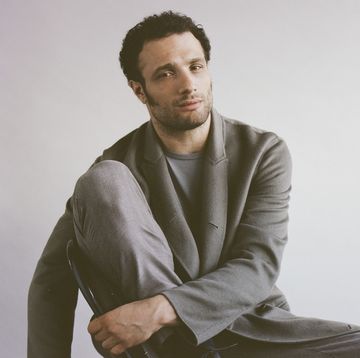Many, if not most, of the reviews of the new season of Twin Peaks—David Lynch's surreal, small-town soap-slash-fantasy Americana noir that transformed television 25 years ago and that improbably returns this month to Showtime—will reference Riverdale, the CW show where Archie, the red-headed doofus from Archie Comics, is hot.
Yes, critical conversation will compare this auteur-driven, surreal, monumental television series to a teen drama where Cole Sprouse of The Suite Life fame plays Jughead as a brooding art boy whose dad is a gang member played by Skeet Ulrich. This fact might embarrass the more cinephilic people in the Twin Peaks audience: Riverdale is many things, but one thing it is not is an auteur show, and it definitely is not cinematic.
This thread in the oncoming storm of Twin Peaks writing could be chalked up to total coincidence, a quirk of timing—that 25-year window for Twin Peaks' revival happens to occur at roughly the same moment that Riverdale is on the air. (Riverdale's first season came to a close last week, but it dropped on Netflix this week, which will likely boost its popularity throughout the summer.) But the forces putting the two shows in the same conversation are proof of Twin Peaks' enduring, fascinating influence.
TV is, by nature, a scavenger's medium. Smash successes are rare, and when they do happen, development teams try to scrap them for parts. Consider the year every network drama was a Lost ripoff, or the year every network drama was a Mad Men ripoff, or the year—well, you get the idea. This process produces lots of bad shows, but it also makes a lot of commercial sense. And if a show works, why not do a few pleasant riffs on a theme? But where Lost generated mediocre mystery shows and Mad Men spawned slick period pieces, Twin Peaks is the genesis of several distinct strands of TV's DNA.
Twin Peaks was the high-profile initiator of one of TV's hottest trends: movie filmmakers being imported over to television. David Lynch had already made Blue Velvet, and was one of the first high-profile filmmakers to willingly work in television. That list now includes David Fincher (House of Cards), Martin Scorsese (Boardwalk Empire), Steven Soderbergh (The Knick), Joe Swanberg (Easy), the Wachowskis (Sense8), even Woody Allen (whatever that show was called). Twin Peaks didn't single-handedly give movie directors the go-ahead to play around in TV—that owes a lot to upstart networks and streaming services trying to buy attention—but it certainly helped open the door.
In front of the camera, Twin Peaks' tone inspired an entire subgenre of gloomy series set in the Pacific Northwest. Just in the past few years, Wayward Pines drew heavily on Twin Peaks' iconography, adapted from a novel that was itself influenced by Twin Peaks. (The endless funhouse cycle of influence and adaptation is another hallmark of TV.) Bates Motel drew on Twin Peaks' imagery while remaking its own film classic in Psycho. And The Killing, though imported from Denmark, had so much in common with Twin Peaks—the setting, the tone, the murdered teenage girl—that the headline of Slate's original review described the show as having "some of that Twin Peaks flair."
Even if you remove the murder mystery, many—not most—shows about small-town America from the past two decades owe some debt to Twin Peaks, whether that's Northern Exposure, Eerie, Indiana, or even Happy Town, a short-lived show from 2009 whose trailer opens with a voiceover saying "from the network that brought you Twin Peaks." These environments weren't new when Lynch began exploring them, but his relentless gaze changed the way the rest of us looked at them, even seeping into previously pristine, pre-existing versions of the American ideal. Which brings us to Riverdale, a show about a picturesque small town with a seedy, murderous underbelly.
Twin Peaks was many things, but one of the things it's least well-known as is a high school show: For all the show relied on the supernatural and on its procedural elements, many of the most important characters are Laura Palmer's fellow students. The teen drama mixed with noir is a blend of genres that helped produce Veronica Mars. That is a teen-murder noir that may have traded the pine trees for blasted-out Southern California, but whose thematic and visual focuses—seeing and being seen, class, and the consequences of looking for the truth—made it one of the best shows with a Twin Peaks fingerprint. Riverdale is no Veronica Mars, but it's working from the same playbook.
More than anything, Riverdale understands what it means to be a television show. It's gripping, melodramatic, funny, visually gorgeous, and insane on any given week (sometimes in any given minute), and demands rapt, ideally live attention from its fans. Not for nothing have half my texts in the past three months been variations on "Who do U think killed Jason Blossom?" In playing up its goofier, soapier, more lurid instincts, it's trying, and at least partially succeeding, at being a genuine phenomenon—territory Twin Peaks found itself in almost by accident, but that nevertheless defines the show's legacy. (Hence the rapt burst of attention the show is about to receive.)
Obviously, Riverdale doesn't draw nearly as many viewers as Twin Peaks did. Even the revived version of Twin Peaks won't draw that many viewers (34 million people watched the first episode of Twin Peaks, which is more people than have subscriptions to Showtime). The TV landscape has changed since the 1990s, in part because of Twin Peaks—in a way that has both made Riverdale possible and ensured the Twin Peaks revival at the same time was, if not inevitable, at least highly likely. Even if the similarities are overblown, Twin Peaks and Riverdale do share one important thread (besides the fact that they're both about Lodges and Coopers): As appealing as the memory of the past might be, you can't go back again.














